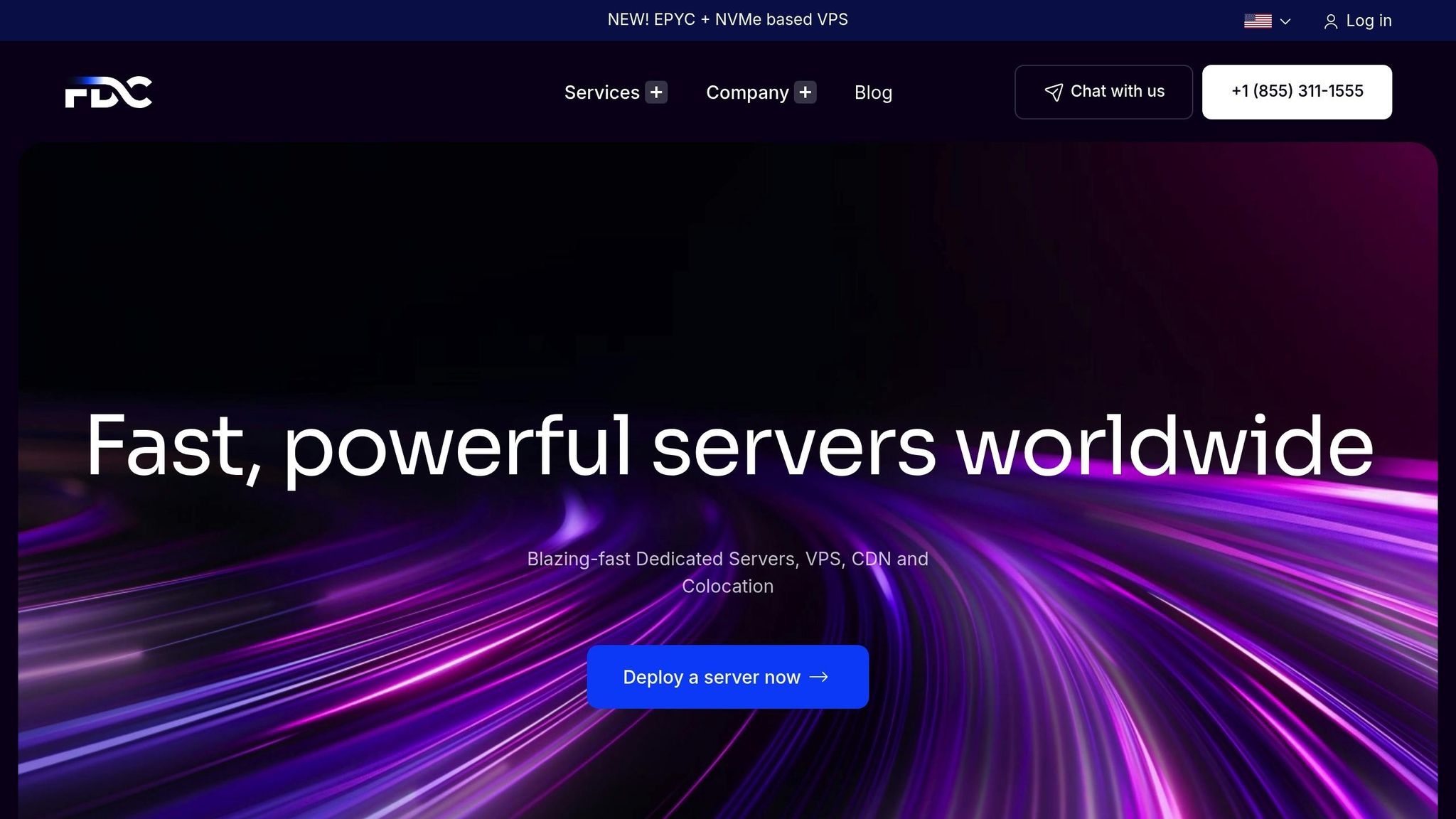VPS vs Dedicated Servers: Which Is Right for You?
8 min read - September 12, 2025

Explore the differences between VPS and dedicated servers to choose the best hosting solution for your website's needs and budget.
VPS vs Dedicated Servers: Which Is Right for You?
When choosing a hosting solution, the decision often boils down to VPS (Virtual Private Server) hosting or dedicated servers. The right choice depends on your website's traffic, budget, and performance needs:
- VPS Hosting: A cost-effective option that uses virtualization to provide isolated resources on shared hardware. Ideal for small to medium websites, startups, and projects with fluctuating traffic.
- Dedicated Servers: A physical server entirely dedicated to your needs. Best suited for high-traffic websites, resource-intensive applications, and businesses requiring advanced security.
Key Differences:
- Cost: VPS plans can start around $10/month, while dedicated servers begin at $90/month or more.
- Performance: VPS handles moderate traffic well, but dedicated servers deliver peak performance for demanding workloads.
- Scalability: VPS allows quick upgrades, while scaling dedicated servers often involves downtime.
- Security: Dedicated servers offer full physical isolation, while VPS provides virtual isolation.
VPS Hosting: What You Need to Know
Virtual Private Server (VPS) hosting strikes a balance between shared hosting and dedicated servers. It offers dedicated resources and control without the hefty price tag of a physical server. Essentially, you get exclusive resources while still sharing the hardware with others.
How VPS Hosting Works
VPS hosting relies on virtualization technology to partition a single physical server into multiple isolated virtual environments. A hypervisor - a software layer - creates these virtual machines, ensuring each operates independently. While the hardware is shared, your VPS gets its own guaranteed slice of CPU, RAM, storage, and bandwidth that other users can't interfere with.
With its own operating system, applications, and files, your VPS functions much like a standalone server. Many VPS plans today come with high-performance features like NVMe SSD storage for quicker data access and unmetered bandwidth to handle traffic spikes without additional costs. Providers like FDC Servers incorporate these technologies to deliver consistent performance for websites, applications, and development projects.
VPS Hosting Advantages
VPS hosting offers several standout benefits:
- Affordable dedicated resources: With costs typically ranging from $25 to $100 per month, VPS hosting provides the perks of dedicated resources at a fraction of the price. This makes it a solid choice for small to medium businesses seeking reliable performance without overspending.
- Quick scalability: Need more RAM or CPU power during a traffic surge? Most VPS providers allow you to upgrade resources almost instantly, making it a flexible solution for growing businesses or websites with seasonal traffic patterns.
- Fast setup: Many VPS plans feature one-click installations for tools like WordPress, databases, or development frameworks. You can have a fully functional website or application running in under 30 minutes.
- Full control: VPS hosting gives you root access, letting you install custom software, tweak server configurations, and manage security settings. This level of control isn’t available with shared hosting.
VPS Hosting Drawbacks
While VPS hosting has plenty of advantages, it isn’t without challenges:
- Performance variability: Even though your resources are guaranteed, the physical server is shared. If other users on the same hardware experience high resource usage, you might notice slower disk I/O or network speeds.
- Technical expertise required: Unlike shared hosting, VPS hosting often requires you to handle tasks like software updates, security patches, and server maintenance. This can be daunting if you’re not tech-savvy.
- Resource limits: While VPS offers more resources than shared hosting, heavy-traffic websites or resource-intensive applications can eventually outgrow even the largest VPS plans.
- Security responsibilities: You’re responsible for configuring firewalls, managing user access, and ensuring software is up to date. A poorly configured VPS can expose vulnerabilities, potentially affecting not only your site but others on the same server.
Next, we’ll explore dedicated servers to see how they compare.
Dedicated Servers: What You Need to Know
While VPS hosting offers shared hardware with flexible resource allocation, dedicated servers stand out by providing exclusive access to an entire physical machine. This setup ensures full control and uncompromised performance for your applications.
The growing demand for dedicated servers reflects the need for high-performance, reliable hosting solutions capable of handling heavy workloads.
How Dedicated Servers Work
A dedicated server is a standalone physical machine housed in a professional data center. When you rent one, you're leasing the entire server, which is located in a secure, enterprise-grade facility.
With a dedicated server, you gain direct access to the hardware. This allows you to choose custom operating systems, install the software you need, and configure the server to meet your specific requirements. For example, FDC Servers offers dedicated server options with features like unmetered bandwidth, ideal for managing high traffic volumes without worrying about overage charges. These servers also include powerful components tailored for resource-intensive applications like AI and machine learning.
These capabilities highlight the unique advantages of dedicated servers.
Dedicated Server Advantages
Dedicated servers come with several standout benefits:
Superior performance: Having exclusive access to all server resources ensures consistent and predictable performance.
"When you go with a dedicated server, you're essentially getting the whole pie to yourself. One of the biggest benefits is performance. Since the server's resources - CPU, RAM, bandwidth - are all yours, you don't have to worry about other websites or applications hogging the resources. This means your website or app will run faster and more reliably, which is crucial if you're running an e-commerce site, a gaming server, or any application where speed and uptime are critical."
- Stuart Green, Business Development at Nextage Technologies
Enhanced security: Dedicated servers provide a fully isolated environment, allowing the use of custom security tools and ensuring compliance with standards like HIPAA or PCI.
Complete customization: Full root access lets you install any software, adjust system configurations, and optimize performance to meet your specific needs.
High reliability: Dedicated servers benefit from enterprise-grade data center infrastructure, including redundant power systems, advanced cooling, and high uptime guarantees. This ensures your services remain consistently available.
Dedicated Server Drawbacks
Despite their advantages, dedicated servers do have some limitations:
Higher costs: Since you're using an entire physical machine, these solutions tend to come with a premium price tag.
Limited scalability: While you can upgrade components like RAM or storage, scaling a dedicated server often requires more planning and may involve downtime - unlike the dynamic scalability of cloud services.
Technical complexity: Managing a dedicated server typically requires technical expertise or managed services to handle updates, performance monitoring, and troubleshooting.
Potential underutilization: If your needs don't fully utilize the server's capacity, you may end up paying for resources you don't use.
For businesses with steady high-traffic demands, resource-heavy applications, or strict security requirements - like e-commerce platforms, streaming services, or companies running AI workloads - the benefits of dedicated servers often outweigh these challenges.
VPS vs Dedicated Servers: Side-by-Side Comparison
Let’s break down the key differences between VPS and dedicated servers to help you make the right choice for your needs and budget.
Performance, Cost, and Features Comparison
Here’s a side-by-side look at how VPS and dedicated servers stack up:
Budget matters when choosing between these options. Entry-level unmanaged VPS plans can cost as little as $3–$4 per month, while basic dedicated servers typically start at $70–$120 per month.
When to Choose VPS vs Dedicated Servers
Deciding between VPS and dedicated servers depends on your specific needs, not just the price tag.
- Go with VPS if you’re running small to medium websites or need flexibility. It’s perfect for personal blogs, small e-commerce sites, development projects, or testing new applications before committing to a larger infrastructure.
- Choose dedicated servers for high-traffic websites or resource-intensive tasks. They’re ideal for video streaming platforms, enterprise software, or applications handling sensitive data that require heightened security.
For example, a growing SaaS company might begin with a VPS setup to manage costs and scale easily. As their user base grows and performance demands increase, they can transition to a dedicated server for better reliability and control.
Enterprise-level needs often make dedicated servers the go-to choice. Businesses handling financial transactions, healthcare providers managing patient data, or gaming companies running multiplayer servers rely on the consistent performance and advanced security of dedicated hardware.
FDC Servers offers both VPS and dedicated hosting solutions designed to meet varying needs. Their VPS plans are cost-effective and flexible, making them great for businesses on the rise. Meanwhile, their dedicated servers feature powerful hardware and unmetered bandwidth, perfect for demanding tasks like AI workloads. This ensures you can start with the right setup and scale as your needs grow.
The key is finding the balance between your current requirements, growth plans, and budget. By understanding how these hosting options differ, you can confidently choose the one that aligns with your goals.
How to Choose the Right Server Type
Picking the right server is all about aligning it with your business needs and future plans for growth.
Key Factors to Consider
- Budget Planning: Look at the total cost, including setup fees and any additional charges. If you need flexibility without breaking the bank, VPS could be a great fit. On the other hand, if you require maximum power and resources, a dedicated server might be worth the investment.
- Traffic Patterns: Consider how much traffic your site handles. VPS is ideal for moderate or fluctuating traffic, while dedicated servers are better suited for consistently high traffic levels.
- Technical Expertise: Assess your team’s technical capabilities. VPS offers user-friendly controls, making it manageable for smaller teams. Dedicated servers, however, demand more advanced IT skills for proper management.
- Security Requirements: If you’re handling sensitive data, dedicated servers offer physical isolation, which can be a big advantage. VPS provides robust virtual isolation, but industries with strict regulations may lean toward the added security of dedicated servers.
- Growth Projections: Think about your future needs. VPS is scalable and adapts as you grow, whereas dedicated servers are built for handling consistent, heavy demands.
- Application Demands: For resource-heavy tasks like video processing or AI workloads, dedicated servers deliver the full power of dedicated hardware.
By weighing these factors, you can find the right fit for your hosting needs.
FDC Servers' VPS and Dedicated Server Options

FDC Servers has solutions tailored to meet a variety of business requirements.
Their VPS plans start at just $6.99 per month and come equipped with EPYC processors and NVMe storage. These plans combine high performance with unmetered bandwidth, making them a cost-effective choice for businesses looking to balance efficiency and affordability. As FDC Specialise in high bandwidth even VPS plans can provide very fast unmetered preformance.
If dedicated resources are what you need, FDC Servers offers Dedicated Servers starting at $129 per month. These servers include full root access, customizable configurations, and instant deployment, meaning you can get your server up and running in minutes.
With a global network spanning over 70 locations, FDC Servers allows you to host services closer to your users. This reduces latency and ensures reliable performance as your business scales. Plus, their 24/7 support and custom configuration options mean your hosting environment can grow alongside your needs.
Whether you’re starting with a VPS or upgrading to a dedicated server, FDC Servers provides the flexibility and reliability to support your business as it evolves.
Conclusion
Deciding between VPS and dedicated servers boils down to what your business truly requires. VPS hosting is a great choice for businesses on the rise, offering flexible and budget-friendly resources. It’s especially suited for handling fluctuating traffic, creating development environments, or managing projects that need room to grow.
On the other hand, dedicated servers are all about delivering peak performance and total control. They’re the go-to option for high-traffic websites, demanding applications, or situations where security and compliance are non-negotiable.
When making your choice, consider factors like your budget, traffic trends, technical know-how, security requirements, and long-term growth plans. Don’t forget to assess your application’s demands - tasks like AI processing or video rendering often call for the raw power of dedicated hardware.
For businesses weighing their options, FDC Servers provides both VPS and dedicated hosting solutions. With their robust performance and global network, they ensure fast and reliable access for your users, no matter where they are.
FAQs
How do I decide between a VPS and a dedicated server for my business?
When deciding between a VPS (Virtual Private Server) and a dedicated server, it's all about understanding your business's specific needs and priorities. Key considerations include performance expectations, budget constraints, scalability, and security requirements.
A dedicated server gives you complete control over hardware resources, making it perfect for high-demand applications, large-scale operations, or businesses that can't afford downtime. That said, this option usually comes with higher costs and often requires a certain level of technical know-how to manage effectively.
In contrast, a VPS is a more cost-effective solution where server resources are shared among multiple users. It's well-suited for small to medium-sized businesses or those with moderate resource demands. However, it may not deliver the same performance or security as a dedicated server.
To choose the right option, consider your technical capabilities, your plans for future growth, and any specific security measures your business might need.
How does VPS scalability compare to dedicated servers, and why does it matter for business growth?
VPS provides more flexibility when it comes to scaling compared to dedicated servers. Need more CPU power, RAM, or storage? With VPS, you can adjust these resources through virtualization, often in just a few minutes. This makes it a great option for managing sudden traffic surges or meeting evolving business demands without experiencing much downtime.
On the other hand, scaling a dedicated server usually means upgrading or replacing physical hardware - a process that can be both time-intensive and expensive. For businesses looking to grow quickly or adapt to shifting needs, VPS offers a more adaptable and budget-friendly way to keep operations running smoothly while responding to new opportunities.
What are the security differences between VPS and dedicated servers, especially for businesses managing sensitive data?
When it comes to protecting your data, dedicated servers stand out thanks to their physical isolation. Since the hardware is exclusively yours, there's no risk of other users on the same server causing breaches. This setup also gives you full control over security configurations, making it a great choice for businesses dealing with sensitive information or strict compliance standards.
Meanwhile, VPS hosting provides virtual isolation, which can still meet the security needs of many businesses. However, because VPS environments share physical hardware with other users, there’s a slight risk of vulnerabilities - whether from the hypervisor or from "noisy neighbors." If your business handles highly sensitive data, dedicated servers are often the safer bet, offering complete physical separation and the flexibility to fine-tune security settings.

How to install and use Redis on a VPS
Learn how to install and configure Redis on a VPS for optimal performance, security, and management in your applications.
9 min read - January 7, 2026
Monitoring your Dedicated server or VPS, what are the options in 2025?
12 min read - November 28, 2025

Have questions or need a custom solution?
Flexible options
Global reach
Instant deployment
Flexible options
Global reach
Instant deployment